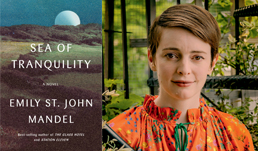- Categories:
A Q&A With Emily St. John Mandel, Author of April Indie Next List Top Pick "Sea of Tranquility"
- By Emily Behnke
 Independent booksellers across the country have chosen Emily St. John Mandel’s Sea of Tranquility (Knopf) as their top pick for the April 2022 Indie Next List.
Independent booksellers across the country have chosen Emily St. John Mandel’s Sea of Tranquility (Knopf) as their top pick for the April 2022 Indie Next List.
Sea of Tranquility follows a cast of seemingly disparate characters on a journey that begins on Vancouver Island in 1912 and ends on a dark colony on the moon five-hundred years later.
“A gem of a novel, spiraling out of place and time to shape our present hopes and anxieties into a story of peace and resilience,” said Dan Brewster of Prologue Bookshop in Columbus, Ohio. ”Mandel weaves effortlessly between historical and science fiction and is a master of immersive storytelling.”
Here, Bookselling This Week talked about writing the book with Mandel.
Bookselling This Week: How did the idea for this story come to you?
Emily St. John Mandel: I’d been working on autofiction for a while, just as an experiment. I wasn’t sure I’d do anything with it — it seemed like the sort of thing that might be the seed of a new book but then not end up being part of the final version, which isn’t that unusual for me in starting a new book. At the same time, I’d been thinking about writing a time travel story.
Then the pandemic hit, and I wanted to write about it but not too directly, because the lived experience was unbearable, so I decided to write about it through a sci-fi lens.
Time travel narratives tend to fall apart under close scrutiny, but it seemed to me that if I were to add the simulation hypothesis, that might be a way to make it work. Having a character say “we’re not sure why time travel works as well as it does, because it seems to us that sending someone back in time should always create a closed loop and yet somehow it doesn’t” was a way to make it work.
BTW: Like some of your other work, this book navigates multiple timelines: we explore North America two centuries ago, in 2020, and centuries into the future. What drew you to these time periods? Why structure a novel in this way?
EM: The structure of this novel was based on David Mitchell’s Cloud Atlas, which is one of my favourite books. I admire the symmetry of the structure, and the vast scope of time, from distant past to distant future, and I wanted to see if I could structure a novel in the same way, with a similar sense of scale.
BTW: What was the experience of writing this book like for you?
EM: This novel was something like a refuge for me. I wrote it almost entirely during 2020. I live a mile from a hospital in New York City, so for the first several months of the pandemic there was a backdrop of constant sirens, all day and all night. There was a week in April when seven-hundred people died every day in my city. So it was an atmosphere of death and calamity, and it meant a lot to me to have this project I could immerse myself in. It was something to focus on aside from the nightmare we were living in.
BTW: What made you want to return to the cast of The Glass Hotel?
EM: I like those characters and wanted to spend more time with them.
BTW: Reading the author Olive Llewellyn’s sections, I couldn’t help but notice parallels to your own work — Marienbad feels similar to Station Eleven, for example, and you’ve spoken about requests for op-eds in the weeks directly following lockdown, something Olive also deals with. What were your intentions in writing Olive’s character?
EM: I wanted to write about the experience I was having in the early months of the pandemic as the author of Station Eleven, and I also wanted to write about the experience of the marathon promotional book tour.
BTW: This book, like Station Eleven, also incorporates genre elements. Does anything in particular inspire the exploration of sci-fi in your work?
EM: I’ve just always loved the genre. There was a long period in my late teens when I only read sci-fi. My reading preferences have expanded since then, but I still think of it as the genre where you get to go to the furthest limits of imagination.
BTW: Is there any one thing you’d want readers to take away from this book?
EM: No. An idea I really like is that ten readers might read one of my books and come away with ten different ideas of what the book was about. I don’t write books with a single take-away message in mind.
BTW: What role do indie bookstores play in your life?
EM: Independent bookstores are among my favourite places in any given city and I love visiting bookstores when I’m traveling. It’s just such a pleasure to spend time in those spaces. My first three novels were published by a very small press, and I’ll never forget how independent booksellers championed those books and am forever grateful for the support that has continued throughout my career.
BTW: Can you tell readers what you’re working on next?
EM: I’m working on a new novel. I’m also writing a screenplay with a friend of mine — it’s a noir adaptation of my first novel, Last Night in Montreal.

